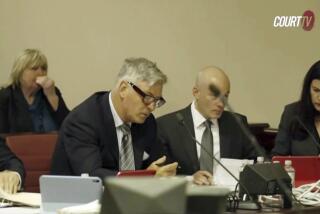Everyone Just Be Quiet and Pick Any 12 Jurors
- Share via
The Simpson case lawyers could fire their expensive consultants, drop their media manipulation, pick the first 12 prospective jurors who come through the door--and still get as fair a trial as possible.
I’ve always suspected this, and my feelings were confirmed Monday when I interviewed non-Simpson case jurors sitting on benches in the 11th-floor hallway of the Criminal Courts Building.
These are the unknown jurors, the grunts, as opposed to the Simpson case jury prospects now at the center of attention as attorneys, acting as if they were questioning suspects, poke and prod their minds. Nobody cares what movies the grunts have seen or whether they or anyone close to them has undergone an amniocentesis. When judges and lawyers question them, it doesn’t take much time and their answers aren’t broadcast or printed.
I was interviewing them because this is their week. Somebody in the Civic Center finally stood up for the jurors. Los Angeles County’s Citizens Economy and Efficiency Commission is expected to approve a report Wednesday declaring:
“All too often jury service in Los Angeles County, as elsewhere, is characterized by those participating as an experience of frustration, wasted time, uncomfortable and unattractive facilities, a lack of information to adequately understand the process and the failure to recognize the sacrifices involved in the performance of jury service. . . . Jurors have the lowest priority in the judicial system when it comes to concern for their treatment and funding for their services and facilities.”
I’ve been complaining about the physical discomfort visited upon jurors since my own jury duty. Lately, listening to the voir dire questioning of the prospective Simpson jurors, I’ve become aware of the mental pain they must suffer.
Prosecution and defense attorneys seem to really believe that their questions will reveal the perfect juror. In that, they remind me of National Football League scouts who measure athletes’ body fat, muscle bulk, speed and urine content, looking for the perfect prospect.
What the tests don’t reveal are character, courage and common sense, the ingredients that make a great NFL player--and an effective juror.
*
I wanted to talk to jurors about the physical discomforts and to get an idea of their attitude toward their civic duty.
They had their complaints, same as I did. “They don’t have enough telephones,” said a man, pointing to two pay phones in the hallway. If anyone wanted to bring a laptop and do some work, they’d have trouble communicating with the office via modem. The Citizens Economy and Efficiency Commission recommended computer facilities for jurors.
Another complained about the poor quality of water in the Criminal Courts Building. The commission told the Board of Supervisors to “immediately repair or replace the water supply equipment.”
A third juror told me: “They don’t have enough seating inside the assembly room or outside the courtroom.” Most said it took a half-hour to 45 minutes to get out of the parking lot.
But don’t get the wrong idea. Even the jurors with complaints had a good attitude toward jury duty. To use a phrase that sounds out of date in these cynical times, they were public-spirited citizens.
I talked to three alternates on a jury that was deliberating. They had heard the testimony, same as the regular jurors. When the trial was done, the jurors started going over the case. The alternates waited outside, on a bench. Their service, both in listening to the evidence and waiting outside the courtroom, has occupied almost a month.
“The bad part is the length involved,” one of them said. “Everybody complains the process is so long. People at my work say that.” But he didn’t agree. “If you have a conscience, you can’t be fast with this. It has to be slow and deliberative.”
All three--along with a man and a woman sitting near them--agreed that they had learned a lot about the criminal justice system, and had come away with a lot of admiration for the judges for handling big caseloads.
I asked what they thought of the system. “It works,” a man said.
*
Then I walked up to our 12th-floor pressroom and listened to the nitpicking questioning of the Simpson jury panelists. Defense attorney Robert L. Shapiro wanted to know what juror 353 (they are anonymous) expected of Simpson during the trial.
She said she expected him to “sit there and listen.”
Deputy Dist. Atty. William Hodgman asked her about a multiple defendant murder trial in which she had served as a juror a few years ago. Some of the defendants had been convicted, but the jury hung on others.
“We tried very hard,” she said. “We went back to the judge several times . . . we just weren’t getting anywhere. . . . The judge agreed.”
How did you feel when you walked out of the courtroom? Hodgman asked.
“I was a lot younger,” she said. “It felt good. I remember the people (on the jury).”
However, if she had it to do again, she said, “I would do it differently, with my life experience.” She said she would listen to her own convictions more, not be so ready to follow the opinions of others.
I thought she was a thoughtful person. Her replies to Shapiro and Hodgman had a lot of common sense. She sounded as if she would be a good juror, as did the men and women I talked to earlier in the morning.
The lawyers are asking too many questions. They’re wasting their time trying to propagandize during the selection process. Just pick 12 men and women from the Criminal Courts Building benches. Any 12 will do.
More to Read
Sign up for Essential California
The most important California stories and recommendations in your inbox every morning.
You may occasionally receive promotional content from the Los Angeles Times.












